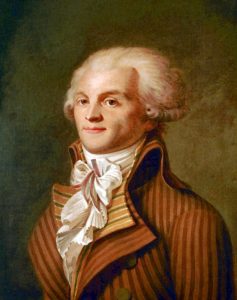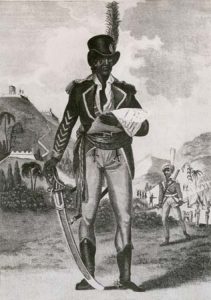[Click on the first photo to start the slide show…]
France had a more educated 3rd class including women. The educated members of the 3rd estate were the philosophes of social contract thinking in the Enlightenment.
The French Revolution
- Revolutionaries drew inspiration from enlightenment political thought
- Much more radical revolution than its American counterpart
- The French revolution was both a political and a social uprising
- France was originally a monarchy ruled by King Louis XVI
- Financial troubles led France down a road to revolution
- 3/4 of French revenue went to war debts and armed forces, and the peasantry could not be taxed even more
- King tried taxing Aristocrats, but they protested this effort and summoned the Estates General, a representative meeting
- Third Estate (The upper class) supported reform, but other estates turned it down, so the Third Estate formed their own National Assembly
- The National Assembly sparked violent rebellion throughout the cities and streets of France
- Jean-Paul Marat also helped “light the people’s fire”
- He wrote over exaggerated articles in his newspaper to anger people, until he was assassinated on July 13, 1973 by Charlotte Corday
- Emboldened by popular support, the National Assembly wrote the “Declaration of the Rights of Man and the Citizen ” which was similar to the American constitution
-

Robespierre “The king must die so that the country can live”Was a Revolutionarie the French Revolution was influenced by Enlightenment ideals, particularly the concepts of popular sovereignty and inalienable rights. Robespierre was the head of the bloody french revolution of the late 1790’s. As an orator (public speaker), he praised revolutionary government and argued that the Terror was necessary. Robespierre encouraged the execution, mostly by guillotine, of more than 17,000 enemies of the Revolution.
The Haitian Revolution
- The only successful slave revolt in history took place in Haiti
- In 1789, the French revolution broke out in France. So naturally the French colonists of Saint Dominique wanted to govern themselves
- They however, ignored proposals to give political equality to the “gens de color”, free people of color
- In 1791, a fight broke out between the gens de couleur and the French settlers in Saint Dominique
- A well liked voodoo priest, named Boukman organized a slave revolt in the same year
- Boukman died and the slaves overwhelmed the French colonists under the leadership of Francois-Dominique Toussaint
- However Toussaint called himself L’overture,
- In 1801 L’ouverture wrote a constitution granting rights to all the residents of Saint Dominique
- He didn’t however go as far as declaring independence from France because he didn’t want to deal with Napoleon
- But Napoleon sent troops anyways and captured Toussaint
- The Black leaders who came after Toussaint defeated the remaining French Troops and declared independence in 1804.




o_0 • Feb 8, 2017 at 12:26 pm
This article was simple and direct, easy to understand.
Here two trusted .edu websites if you want to check for more information about the biography of this two revolutionaries.
Toussaint Louverture: http://docsouth.unc.edu/neh/beard63/summary.html
Maximilien Robespierre: http://www.loyno.edu/~history/journal/1983-4/mcletchie.htm
:) • Nov 11, 2016 at 8:57 am
I think that this article was very thorough and detailed. It was easy to read but also informative. I think that it is very interesting that the Haitian revolution was the only successful slave revolt in history but the thing is that it didn’t help in the long run. Maybe it helped with the slavery but now, Haiti is still the poorest country in the world. Haiti was inspired by the French Revolution as well as Germany and Italy. These European countries were inspired greatly by Napoleon while Haiti was greatly inspired by Robespierre. I think that the French Revolution is very important to compare because in reality, it had a huge effect all over the world in the long run.
2LtMartinez • Nov 11, 2016 at 8:54 am
I liked what you did with your post. However, to me it seems like you wrote a bit too much about both Max and Toussaint but not much about how both of this events can relate. Both videos were a very good source of information but I think for future works you could do a part were it explains how both of this events are similar. In my opinion the French Revolution and the Haitian Revolution are similar because they both were started by the ideas of the Social Contract theory learned by the educated class. The French Revolution was more a reaction to Absolute Monarchy while the Haitian Revolution was all about slavery. The French ended with a dictator Napoleon who actually interfered with the Haitian Revolution by capturing Toussaint L’ouverture. Toussaint died in prison but inspired the success of Haitians. In the end their independence was weak because their power depended on the Sugar Plantations and an unequal social structure.